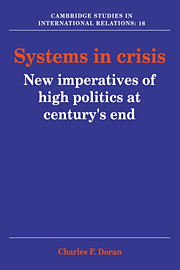Book contents
- Frontmatter
- Contents
- Preface
- Acknowledgments
- Introduction: new perspectives on the causes and management of systems crisis
- Part 1 Dynamics of state power and role: systems structure
- Part 2 Dynamics of major war and systems transformation
- Part 3 Dynamics of general equilibrium and world order
- 6 Prerequisites of world order: international political equilibrium
- 7 World order and systems transformation: guidelines for statecraft
- Part 4 Systems transformation and world order at century's end
- Appendix: Mathematical relations in the power cycle
- References
- Index
6 - Prerequisites of world order: international political equilibrium
Published online by Cambridge University Press: 08 September 2009
- Frontmatter
- Contents
- Preface
- Acknowledgments
- Introduction: new perspectives on the causes and management of systems crisis
- Part 1 Dynamics of state power and role: systems structure
- Part 2 Dynamics of major war and systems transformation
- Part 3 Dynamics of general equilibrium and world order
- 6 Prerequisites of world order: international political equilibrium
- 7 World order and systems transformation: guidelines for statecraft
- Part 4 Systems transformation and world order at century's end
- Appendix: Mathematical relations in the power cycle
- References
- Index
Summary
International politics has its own understanding of general equilibrium that is sui generis to the field, and while not incompatible with the notion of Pareto optimality, is not dependent upon it. A distinctive characteristic of the determination of general equilibrium among a few leading governments in the central system in terms of the distribution of power and foreign policy role is not knowledge of what equilibrium is, or even where it obtains (see theoretical discussion in chapter 1). The distinctive problem for world politics is that (1) because of short-term tendencies toward power maximization, and (2) because of rigidities in the capacity of government elites to adjust to new international political circumstances, governments often are unable to move toward a generally acceptable equilibrium point. Thus, in world politics, the focus must be on strategy and motivation necessary to get governments, in their own long-term collective self-interest, to move to such positions of international political equilibrium.
BALANCE AS SYSTEM VERSUS BALANCE AS FUNCTION
In the nineteenth century, the European diplomatic system came to be considered as synonymous with the balance of power (Gulick 1955; Wolf 1970; Zinnes 1967). The assumptions of the balance-of-power system were quite simple. Only five actors composed the central system: Britain, France, Russia, Austria-Hungary, and Prussia.
This number was neither too many to facilitate information flow and accountability nor too few to allow for stable movement of governments between coalitions.
- Type
- Chapter
- Information
- Systems in CrisisNew Imperatives of High Politics at Century's End, pp. 143 - 165Publisher: Cambridge University PressPrint publication year: 1991



